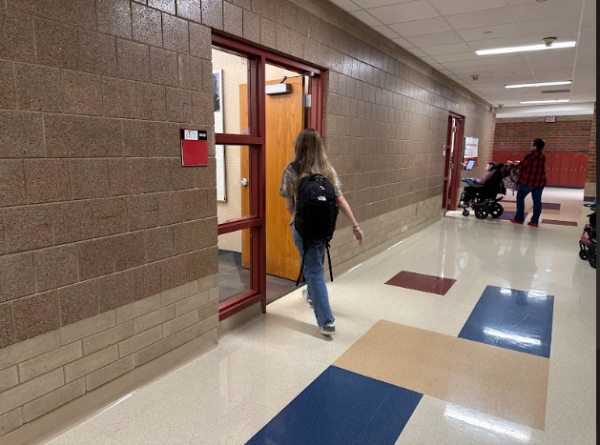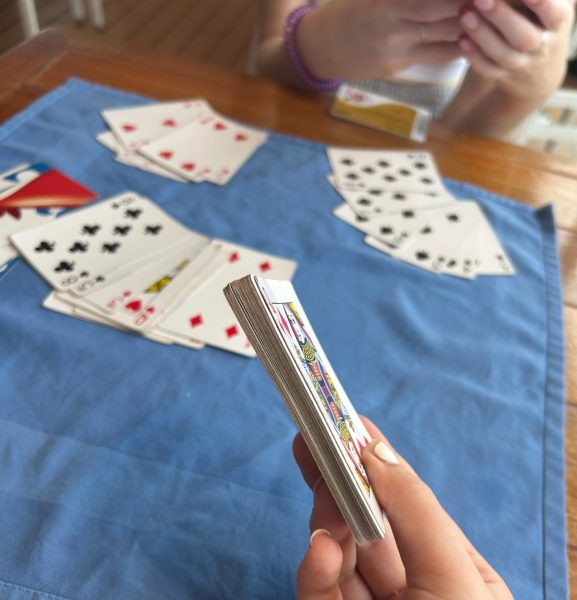“Golden tickets” prove effective, reduce tardies

Sitting in detention is never fun for anyone involved. However, students have been serving detentions just for being late to class. Many have mixed reactions to the tardy ticket policy, even when it has proven to be extremely effective. Students need a push in the right direction, even if a harsh punishment is involved.
Many students dislike the new “golden tickets” that are given out when they are tardy, but most are upset over having to serve detentions. Students receive a ticket and a 30-minute detention every time they are late to class. The building administration created the policy to keep students in their classrooms and not walking around the hallways to avoid class.
Tardies and unexcused absences were at an extreme high during the 2021-22 school year. Many students had low attendance, with some of them being truant. Building administration could see that there was a need for change. Data showed that many students were wandering the halls for upwards of 10 minutes before going to class, or they were not going to class at all.
“My first process of thoughts was, ‘Yep, absolutely,'” Assistant Principal Shelly Phernetton said. “We have to make a change and do something different from the last two years because there was definitely a need, the need we could see in our data and with our eyes.”
Many adjustments have been made this year to attempt to decrease tardies. Passing time has been increased to seven minutes to give students time to transition from class to class. Office hours are temporarily not in effect to help students focus on their classwork.
“One reason they [increased passing time] was to make everybody feel comfortable,” Stephanie Nord, AP calculus teacher, said. “They could stop and use the bathroom, they wouldn’t have to race. But I think most of my kids come here, drop their stuff off, and then go to the bathroom, because who wants to carry their backpack into the bathroom?”
The tardy policy has already been proven effective as there are now fewer than 50 tardies per day. That means that less than 2% of the school is scanning the QR codes to receive a “golden ticket.” In the span of a month, tardies have been drastically reduced from where they were before.
When asked approximately how many tardies there was a day, Phernetton explained, “We’re right around in that 30-40 range. That’s great.”
A version of the tardy policy existed in 2016, but a student’s first tardy was a warning. Tardies after the warning received detentions. The building was smaller and did not house nearly as many students. There also were fewer hallways and paths to get from classroom to classroom, so tardies were more common.
Nord explained that in 2016 freshmen did not attend the high school. Students received one warning and got detentions for each tardy after that. She added that 2016 was better as there were fewer people in the hallways at the time which helped the policy work better.
Students are not in the wrong for thinking that the new tardy policy is unfair. The policy is over-correcting the attendance issue. Students who are late just one time should not need to take 30 minutes out of their day to sit in detention. Building administration may need to come back and look at the policy later in the year to rework it as needed.
Many students in the building have never been tardy, and do not think they should serve detention for being late one time. The process of going to get a “golden ticket” can be very lengthy, as students must go to their Pony Centers for the slip of paper. This can make students even later to class, and they miss more instructional time.
“If I didn’t have to go through the entire process of getting the slip, getting a stamp, and then walking to class I would have been maybe four minutes late,” junior Jenna Baumgartner said. “But then I was, like, 10-15 minutes late.”
After serving her detention, Baumgartner said, “You literally just sit there. You can have your computer, you just can’t have your phone.”
The new “golden ticket” policy has elicited different reactions, but many can see that the policy works. Students are in their classrooms and out of the hallways. Teachers do not need to stop class, and students can focus on the material they need to learn. Sitting in detention is always better than being out in the halls during class time. This policy is a push in the right direction for learning, and students need to understand that.

I'm Sydney and I'm a senior this school year. I am a Layout Editor-in-Chief. I'm involved in many activities, including Concert Orchestra, Con Amici, GSA...












jackson • Nov 13, 2022 at 6:02 pm
I loved the way you laid out your transitions between paragraphs and the quotes you used were very relevant adding important perspectives.
Grace Cheney • Nov 12, 2022 at 3:29 pm
I believe that this article is very informational and gives a good representation of both sides of the argument. I believe that the new tardy policy is directed toward a small number of kids that like to skip class and can totally understand why students who are never late could be upset with this policy. It is very important though to take into consideration both sides of the argument. Now that I know more of the reasons why this policy is put in place, I am more understanding of it. Now I don’t think it’s as bad as everyone makes it out to be and it seems to really be helping the overall problem of tardies and absences.